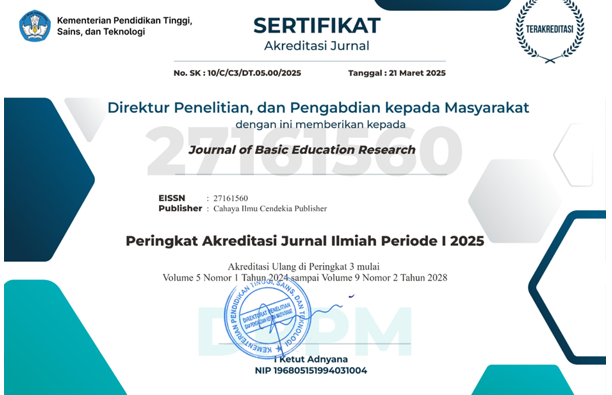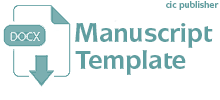Improving Student Learning Outcomes Using Crossword Based Worksheet In Primary Schools
Abstract
Purpose of the study: This research aims to improve student learning outcomes by using TTS-based LKPD in the learning process.
Methodology: This research was carried out in class IV.B of Elementary School 7 Palembang in the science and sciences subject. The research method used is classroom action research. The population and sample in this study were all class IV students at SDN 07 Palembang. The data collection techniques used by researchers are observation and tests. The data analysis technique used is qualitative analysis and quantitative analysis.
Main Findings: The results of research using TTS-based LKPD in science and science subjects in class IV can improve student learning outcomes with results in cycle I as much as 45.4%, cycle II as much as 81.8%, and cycle III as much as 88.4% as well as post-test 95.4% with a student completion target of 85%.
Novelty/Originality of this study: TTS-based LKPD can improve student learning outcomes in class IV science and science subjects at Elementary School 7 Palembang.
References
M. Ainul, “Pemanfaatan media teka teki silang untuk meningkatkan aktivitas dan hasil belajar peserta didik di smk smti Padang,” EDUSAINTEK J. PENDIDIKAN, SAINS DAN Teknol., vol. 8, no. 1, pp. 35–50, 2021. https://doi.org/10.47668/edusaintek.v8i1.180
A. Ramadhanti and N. N. Simamora, “The Use of Fractional Card Media-Based Concept Attainment Models to Improve Understanding of Fractional Concepts”, J. Bs. Edu. R, vol. 4, no. 1, pp. 10-19, 2023. https://doi.org/10.37251/jber.v4i1.305
F. N. Ichsan and H. Hadiyanto, “Implementasi perencanaan pendidikan dalam meningkatkan karakter bangsa melalui penguatan pelaksanaan kurikulum,” J. Stud. Guru dan Pembelajaran, vol. 4, no. 3, pp. 541–551, 2021. https://doi.org/10.30605/jsgp.4.3.2021.1203
N. Silvia and Ilyani Ropida, “Analisis hubungan karakter rasa ingin tahu dengan hasil belajar peserta didik kelas V SD”, J. Bs. Edu. R, vol. 3, no. 2, pp. 41-47, 2022. https://doi.org/10.37251/jber.v3i2.249
J. Saputri and R. A. Ferdinan, “The relationship of religious characters to students’ learning outcomes on the content of islamic religious lessons”, J. Bs. Edu. R, vol. 3, no. 3, pp. 76-79, 2022. https://doi.org/10.37251/jber.v3i3.267
P. Rahmadhani and R. P. Wirayuda, “Analysis of students’ ability to work on higher order thinking skills in thematic science learning”, J. Bs. Edu. R, vol. 4, no. 1, pp. 39-44, 2023. https://doi.org/10.37251/jber.v4i1.300
N. Yunaini, R. Rukiyati, M. Prabowo, N. M. Hassan, and A. K. Hermansyah, “The concept of the independent learning curriculum (Merdeka Belajar) in elementary schools in view progressivism educational philosophy. JIP (Jurnal Ilmiah PGMI), vol. 8, no. 2, pp. 95-105, 2022. https://doi.org/10.19109/jip.v8i2.14962
M. Mahirullah, S. M. Husna, and F. Adriani, “Analysis of the Application and Correlation of the Murder Type Collaborative Learning Model on Student Learning Outcomes at Senior High School Jambi”, Jor. Eva. Edu, vol. 4, no. 1, pp. 21-30, 2023. https://doi.org/10.37251/jee.v4i1.293
A. Ramadhanti, “Literature study: Application of positive psychology to the field of education in Indonesia”, Jor. Eva. Edu, vol. 4, no. 2, pp. 62-67, 2023. https://doi.org/10.37251/jee.v4i2.309
P. Zamani, S. B. Haghighi, and M. Ravanbakhsh, “The use of crossword puzzles as an educational tool,” Journal of Advances in Medical Education & Professionalism, vol. 9, no. 2, pp. 102, 2021. https://doi.org/10.30476%2Fjamp.2021.87911.1330
V. V. Mshayisa, “Students’ perceptions of Plickers and crossword puzzles in undergraduate studies,” Journal of Food Science Education, vol. 19, no. 2, pp. 49-58, 2020. https://doi.org/10.1111/1541-4329.12179
R. J. Pearson, “Online Chemistry Crossword Puzzles prior to and during COVID-19: Light-Hearted Revision Aids That Work,” Journal of Chemical Education, vol. 97, no. 9, pp. 3194-3200, 2020. https://doi.org/10.23887/jeu.v11i1.59437
J. S. Tangio, A. Said, M. Paputungan, P. P. Kimia, and J. Kimia, “Perbedaan Hasil Belajar Antara Siswa yang Diajar dengan Media Teka-Teki Silang (TTS) dan Lembar Kegiatan Peserta Didik (LKPD) pada Materi Sistem Koloid,” Jambura J. Educ. Chem, vol. 3, no. 2, 2021. https://doi.org/10.34312/jjec.v3i2.10435
H. K. Agarwal, A. Singhal, and A. K. Yadav, “Crossword puzzle: An innovative assessment tool to improve learning of students in forensic medicine,” Medico-legal Update, vol. 20, no. 1, pp. 18-22, 2020. https://doi.org/10.37506/mlu.v20i1.317
M. Melasari, K. Ismawati, and D. S. Nanda, “The effect of using crossword puzzle towards students’ vocabulary mastery in the eleventh grade students of SMA Muhammadiyah 2 Bandar Lampung in Academic Year 2017-2018,” Journal of English Education Studies, vol. 2, no. 1, pp. 67-73, 2019. https://doi.org/10.12928/tefl.v1i2.285
Khaira, M. (2021). The effectiveness of crossword puzzle in improving mufradat skills. Tanwir Arabiyyah: Arabic As Foreign Language Journal, 1(2), 55-62. https://doi.org/10.31869/aflj.v1i2.2864
U. Sulfia and D. Habibati, “Penerapan Media Teka-Teki Silang Pada Materi Koloid Untuk Meningkatkan Hasil Belajar Peserta Didik,” JIPI, vol. 1, no. 1, pp. 6–15, 2017. https://doi.org/10.24815/jipi.v1i1.9457
T. Rustiyarso, “Penelitian Tindakan Kelas”. Jakarta: 2021.
Z. Aminah, A. Rizki, and M. Bismark, “The effect of the STAD type cooperative learning model with the help of crossword worksheet on biology learning outcomes, especially the cognitive domain,” International Journal of Education and Teaching Zone, vol. 1, no. 2, pp. 69-77, 2022. https://doi.org/10.57092/ijetz.v1i2.31
A. Mardhiyatunnuha, N. F. Amin, and U. F. I. Ibrahim, “Penerapan Media Teka Teki Silang Untuk Meningkatkan Keterampilan Menulis Siswa Kelas X IPS 4 MAN 1 Kota Makassar,” J. Ilm. Multidisiplin, vol. 2, no. 8, 2023. https://doi.org/10.56799/jim.v2i8.2025
T. Nurhayati, D. A. Alfiani, and D. Setiani, “The effect of crossword puzzle application on the students’ learning motivation in science learning,” Al Ibtida: Jurnal Pendidikan Guru MI, 6(1), 124-133, 2019. http://dx.doi.org/10.24235/al.ibtida.snj.v6i1.4186
S. Sugiyono, “Metode Penelitian & Pengembangan : Research and Development,” Bandung: Alfabeta, 2017.
E. Romiyati, A. Ardi Rahman, and E. Budiyono, “Development of Mathematical Student Worksheets Based on Scientific Approaches and PQ4R Learning Strategies on Associated Materials”, Jor. Eva. Edu, vol. 4, no. 1, pp. 17-20, 2023. https://doi.org/10.37251/jee.v4i1.296
Nursakinah, P. Fadillah, Irma Widya Ningsih, and J. Junaidi, “Analysis of the Character of Hard Work in Thematic Learning in Elementary Schools”, Jor. Eva. Edu, vol. 3, no. 4, pp. 119-123, Oct. 2022. https://doi.org/10.37251/jee.v3i4.287
D. W. S. Rahadiyani, P. A. Rivani, and F. Untari, “Implementation of Problem Based Learning Model as an Effort to Improve Student Activities and Outcomes in Temperature and Heat Materials”, In. Sci. Ed. J, vol. 4, no. 1, pp. 19-22, 2023. https://doi.org/10.37251/isej.v4i1.292
H. Restiani and E. M. Sariniwati, “Implementation of the Think Pair Share (TPS) Cooperative Learning Model with a Scientific Approach to Student Learning Outcomes”, In. Sci. Ed. J, vol. 3, no. 3, pp. 86-91, 2022. https://doi.org/10.37251/isej.v3i3.280
Copyright (c) 2023 Mitra Oktavia, Cecil Hiltrimartin, Destieana Wati

This work is licensed under a Creative Commons Attribution-NonCommercial 4.0 International License.
Authors who publish with this journal agree to the following terms:
- Authors retain copyright and acknowledge that the Journal of Basic Education Research is the first publisher licensed under a Creative Commons Attribution 4.0 International License.
- Authors are able to enter into separate, additional contractual arrangements for the non-exclusive distribution of the journal's published version of the work (e.g., post it to an institutional repository or publish it in a book), with an acknowledgment of its initial publication in this journal.
- Authors are permitted and encouraged to post their work online (e.g., in institutional repositories or on their website) prior to and during the submission process, as it can lead to productive exchanges and earlier and greater citation of published work.





.png)


.png)
.png)


















